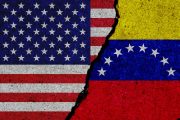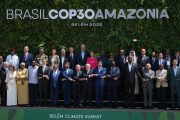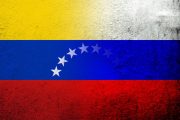In his latest paranoid crackdown on free speech, socialist Venezuelan “President” Hugo Chavez arrested the chief of the last critical television network as well as a popular former governor. Their alleged crimes: criticizing the regime.
Globovision President Guillermo Zuloaga was detained by the military Thursday, March 25, for “offending” the Venezuelan tyrant and spreading “false information” during comments made at an Inter American Press Association gathering in Aruba. Zuloaga reportedly recounted the story of Chavez’ forces opening fire on protestors. He also complained of a lack of press freedom while attacking Chavez’ efforts to shut down media outlets which did not parrot the party line. He owns the only anti-Chavez TV station that still exists in Venezuela — all of the others have already been shut down, including the popular RCTV earlier this year and over 30 critical radio stations.
Zuloaga was released shortly after his arrest as intense pressure mounted against the Venezuelan leadership, but he was ordered to remain in the country while the “investigation” continues. He could face more than five years in prison for his remarks, and insulting the chief executive almost always results in a conviction in Venezuela according to media-freedom monitors.
Human-rights activists, press-freedom advocates, and even international political organizations around the world blasted the action as more proof that the regime is becoming increasingly authoritarian and delusional. But the socialist “president” defended the move, claiming that criticism of the arrest simply illustrates the “cynicism” of “the [American] empire.”
On Monday, March 22, the regime also arrested former Zulia-state-Governor and opposition presidential candidate Oswaldo Alvarez Paz for claiming on Globovision that Venezuela had become a center for drug trafficking and that the Chavez government was supporting various leftist terrorist groups. He was charged with “conspiracy,” spreading “false information” and “inciting hatred.”
But as reported in an article for The New American magazine entitled ‘Resurgent Communism in Latin America,’ Chavez’ and other socialist leaders’ ties to the drug trade and a wide array of terrorist groups are well documented and easy to prove. The U.S. Congress reached a similar conclusion. However, despite the accuracy of Alvarez Paz’ statements, he could be sentenced to more than 15 years in prison. He remains in government custody.
But despite the climate of fear, some Venezuelan opposition leaders still found the courage to criticize the socialist regime’s totalitarian behavior. “Having an opinion in Venezuela is a crime punished with the loss of freedom,” charged National Assembly opposition leader Juan Jose Molina. “We reject everything that restricts freedom of expression in the country, and the witch hunts against those who assume dissident positions.”
A number of former Venezuelan state governors also joined forces to attack the arrests. “These are not isolated events,” the group said in a statement to the media. “It’s all intended to foster self-censorship, intimidation and the fear to freely express oneself.” And indeed, there are many high-profile dissidents living in exile or rotting in Venezuelan jails. Thousands more are under investigation.
Various critics around the world have also condemned the arrests, including the U.S. State Department and myriad international groups. The Organization of American States, for example, is reportedly pressuring the regime to drop the issue. The Inter-American Commission on Human Rights also said it was “concerned” about “the use of the criminal justice system to punish critical expressions.”
Several press-freedom and human-rights groups blasted the government’s actions as well. “The arrests of two well-known opponents of President Hugo Chavez for statements made in public, together with the government’s recently declared intention of regulating the Internet, have raised serious concerns about the future of free speech in Venezuela,” Reporters Without Borders said in a statement. “Given the government’s tendency to treat any criticism or verbal attack as an act of ‘conspiracy against the state,’ one wonders whether Venezuelans are still allowed to say anything at all about their country and their president.” Human Rights Watch and other rights groups also strongly condemned the arrests
And though Venezuela may be one of the most egregious examples, criminalization of free expression in Latin America is by no means limited to the oil-rich country. The communist Cuban dictatorship’s brutality against “thought criminals” has been well known for decades. And on March 26, Dow Jones reported that a journalist in Ecuador was sentenced to three years in prison for criticizing the chief of the state-owned National Finance Corporation.
And while purporting to be popular, democratically elected governments, there are other forces at work which link the various anti-free-speech regimes in their war on freedom. Latin America’s descent into tyrannical dictatorship is rapidly accelerating with the aid of secretive and powerful groups like the Foro de São Paulo (São Paulo Forum), an organization founded by communist tyrant Fidel Castro and Brazilian President “Lula” that combines political parties and ruling regimes with “social movements” and various terrorist and narco-trafficking groups.
And like all countries with centrally managed economies, poverty and desperation will continue to mount in Latin America as long as the trend toward socialism continues. Chavez’ regime cannot even manage to keep the electricity in the capital running. And as Venezuela and other Latin American nations ruled by authoritarian tyrants continue to economically self-destruct, attacking the people who point out the obvious flaws in the system will become increasingly common.
The U.S. government could play a positive role in bringing down these regimes simply by obeying the Constitution and applying common sense. Drug money is one of the primary financiers of the “revolution,” so ending the unconstitutional federal war on drugs would immediately dry up a major source of revenue for the dictatorships and their narco-trafficking terrorist partners like the FARC.
Additionally, oil revenues play a huge role in supporting these socialist governments — especially the regime of Hugo Chavez. Opening up the myriad restricted areas within the U.S. and along the coast to oil exploration would help America become less dependant on the “thugocracies” of Latin America and the Middle East. But instead, the American government unconstitutionally provides billions in foreign aid and other assistance to the regimes while consumers are forced to purchase their oil. For the sake of Latin America, U.S. taxpayers and the political prisoners of the Chavez regime, it is time for real change in American foreign policy.
Photo of Hugo Chavez: AP Images




